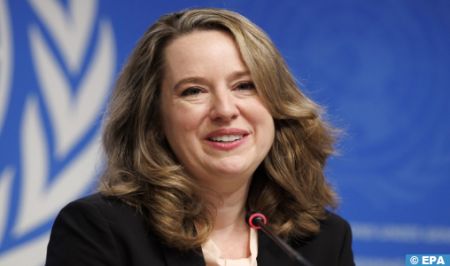
Morocco has been an all-time leader and example when it comes to implementing the Marrakech Global Compact on Migration, but also in terms of best practices to be adopted, Director General of the International Organization for Migration (IOM), Amy Pope, said in Geneva.
“Morocco’s action is global in favor of strong responses to the challenges and opportunities offered by migration,” Ms. Pope said at the 115th Session of the IOM Council, which took place in Geneva November 26-28.
IOM welcomes Morocco’s work in promoting the expansion of regular migration channels, in particular labor migration, and appreciates its cooperation at both bilateral and continental levels, notably between Africa and Europe, she stressed, in response to Morocco’s address by Omar Zniber, Morocco’s Ambassador and Permanent Representative to the United Nations Office in Geneva.
In his speech, Mr. Zniber stated that Morocco has chosen a “humane, pragmatic, and responsible management” of migration, fully in line with the implementation of the Marrakech Global Compact for Safe, Orderly, and Regular Migration, recalling that the Kingdom, by virtue of its geographical position and millenary history, is a crossroads of cultures and civilizations, but also of migratory hopes.
Beyond individual approaches, collective and global action is needed, in which the IOM plays a central role, he insisted, putting forward three key axes in support of the 2024-2028 Strategic Plan, where efforts and ambitions must converge: making migration “a story of renewal;” acting in response to the growing phenomenon of climatic migration; and paving the way for a multiplication of regular migration routes.
With regard to the first axis, the ambassador called for reinventing the way the world perceives migration. “Rather than a burden, it needs to be told in its proper proportions, as the promise, the lever for innovation and transformation that it is,” he said, adding that regular migration highlights migrants’ contributions to economies, sciences, and the arts. These stories, supported by facts, will inspire a new social pact around human mobility.
He then stressed the need to act in response to the growing phenomenon of climate migration. Climate migration must not be left to an emergency. The integration of human mobility into national adaptation plans, supported by technical guides and appropriate funding, enables countries to transform climate challenges into opportunities, he noted, praising IOM’s work in the Climate Mobility Innovation Labs, which place resilience and adaptation at the heart of migration policies.
On the third axis, Mr. Zniber called for paths to be mapped out to increase the number of regular migration routes.
He pointed out that every year, some 15,000 Moroccan agricultural workers take part in seasonal programs organized with Spain, describing this operation as “a partnership model that meets both the needs of European labor markets and the aspirations of Moroccan workers.”
He added that in 2020, remittances from Moroccans living abroad accounted for 7% of national GDP. These flows support families, contribute to economies, and enrich human capital thanks to skills acquired abroad. Morocco will pursue this commitment within the framework of the flagship initiative “Africa Europe for regular migration” carried out with the IOM, he said.
The ambassador also pointed out that Morocco, as a transit and destination country, fully shares IOM’s vision of well-governed migration as a driver of development and stability, both nationally and internationally.
He affirmed that Morocco will continue to support IOM in its institutional reforms, in the mobilization of flexible funding, and in the promotion of a positive narrative on migration. Alongside IOM, and in line with the Marrakech Pact, Morocco is committed to tracing paths where human mobility embodies dignity, solidarity, and collective progress, the diplomat concluded.
